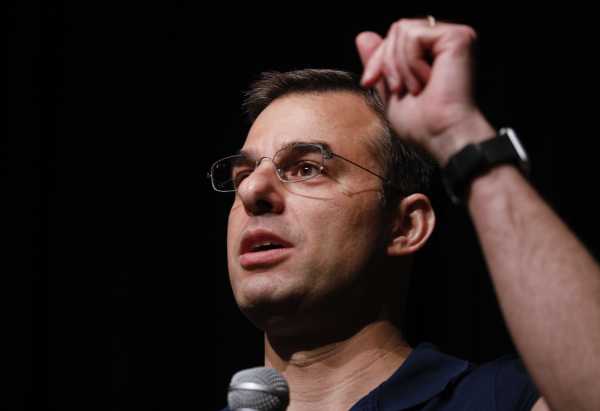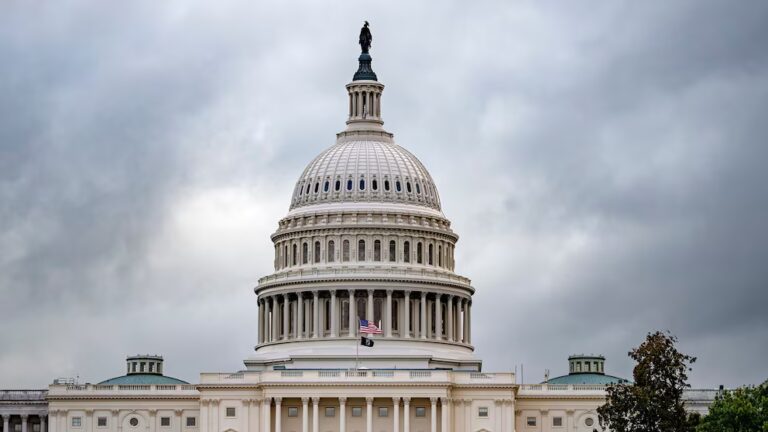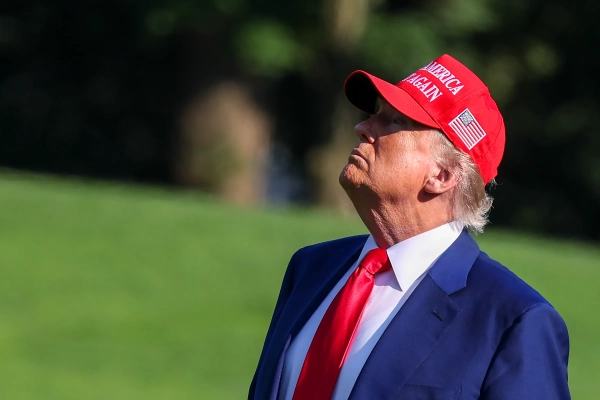
Rep. Justin Amash of Michigan is, for now, the only House Republican arguing that President Donald Trump has “engaged in specific actions and a pattern of behavior that meet the threshold for impeachment.” Now, Amash faces a primary challenge, and growing opposition from those he once considered ideological allies, including a formal censure from the House Freedom Caucus, of which he was a founding member. (He left the group shortly after the censure.)
On a sunny Tuesday in Washington, I met with Amash in his office on Capitol Hill. “A lot of Trump Republicans have this mindset that they have to fight this all out war against the left,” he said. “And if they have to use big government to do it, they’re perfectly fine with that.” It feels, he said, “like I’m among the last of the Tea Party.”
But we began by discussing Sen. Josh Hawley’s (R-MO) efforts to get the government to intervene on behalf of conservative social media users by policing Twitter, Facebook, and others for bias. Our conversation has been edited for length and clarity.
Trump’s brand of conservatism is nationalism, populism, and a “sense of victimization”
Jane Coaston
It seems to me that [the current debate over changing Section 230 of the Communications Decency Act in order to regulate social media companies’ moderation practices] is evidence of the breakdown in the relationship between libertarians and conservatives and kind of a tough time to be a libertarian-minded conservative.
Justin Amash
I think it does play into a general shift within the Republican Party away from a fear of big government and more toward a sense of victimization that society is coming after them. And it might be corporations, it might be people who live in urban centers, [but] they’re coming after them to take away their freedoms and culture.
Jane Coaston
But I think the fact that a Republican is suggesting that companies, private companies, submit to the government that they are being neutral — not just the government, but to unelected FTC commissioners — that is an inherently unconservative idea.
Justin Amash
Well, it depends on what you mean by conservatism. It is more like Trump’s brand of conservatism, which is again, something very different. It’s nationalism and populism and again, a sense of victimization, like the rest of society is coming after us and we’ve got to defend ourselves against that at all costs.
A lot of Trump Republicans have this mindset that they have to fight this all out war against the left. And if they have to use big government to do it, they’re perfectly fine with that. So when I go to Twitter and talk about overspending or the size of the government, I get a lot of reactions now from Trump supporters saying, “Who cares how big the government is”, or “Who cares how much we’re spending as long as we’re fighting against illegal immigration and pushing back against the left.”
Jane Coaston
You came into the House as part of the Tea Party wave that was very focused on rejecting “big government.” And now a lot of the folks who were part of that wave, if they’re still in Congress, have been much more inclined to argue that “if you can’t beat them, join them” with regards to big government. What has that shift been like for you?
Justin Amash
I feel like I’m among the last of the Tea Party. It doesn’t really exist in any major form anymore. It’s been disheartening because the first few years while I was in Congress, I did feel like we were making progress in shifting the dialogue toward limited government and economic freedom and individual liberty.
And over the past few years, it has gone in the other direction, and a lot of the people who once stood with me are no longer there. Some of them got voted out of Congress, and others just don’t emphasize these issues anymore. I don’t think it started because of Donald Trump. I believe Donald Trump is the culmination of many years of shift in this direction.
Jane Coaston
So on that, could you talk more about other ways that you saw that shift coming before kind of June 2015 and the rise of Trump?
Justin Amash
Before then, it was gradual. [Like] this concept of nationalism that I started to see pop up more and more at town halls or on social media, where I heard Republicans speaking favorably of nationalism. And at first I thought it was just people mixing up their terminology. I was like, “No, you mean patriotism.” Like we should be patriotic, [have] love for our institutions in our country and the ideals of liberty, justice, and equality — those are the ideals of patriotism.
But I started to hear [the word] nationalism more and more. And that’s a concept that really is about a love for your people simply by virtue of being your people, not related to any principles you hold or what your country stands for, what ideals you’re striving for. It’s about [how] Americans are just inherently better, or [how] particular Americans in some cases might be viewed as inherently better. And that’s a very dangerous ideology, and it is certainly not what this country was founded on.
Jane Coaston
How would you define what limited government or small-government principles means to you?
Justin Amash
I define them as adherence to the Constitution and to the principles of federalism. That is to say, a government that is closer to home may have more power over your daily life than a government that is far away from you.
So our constitution really follows this design where the federal government is given the power to handle things that are national in scope that affects everyone regardless of their circumstance. As an example, every state needs to be defended against foreign attack, whether the state has a population of 1,000 or 10 million. You have a federal government that defends the nation so that each state doesn’t have to have its own military force to defend against foreign invaders.
Whereas locally, you might have a government that is very involved in your day to day life, but because it’s such a small locale, you can easily avoid it. If you don’t like the government, you can move. You also have more influence over it because it is representing fewer people. So presumably your voice is louder in the mix if you want to complain about the government or change things.
“They will just keep spending until you have a financial crisis”
Jane Coaston
How concerned are you about government spending in the deficit?
Justin Amash
Very concerned.
Jane Coaston
Why? I know this is one of those very “conservatism 101” questions. But we now have a president has talked a lot about how much he loves debt. How do you make the case that this is still an issue?
Justin Amash
I’ve been making the case since I started that it’s not sustainable and the next generation will pay the price if we don’t address it now. We have legislation every week that comes up and it will be offered without offsets. And these days Republicans seem okay with that, just spending more money without reducing spending elsewhere.
People talk about what they hear on TV. So if they hear on TV that a particular issue is the most important, that’s what they’re going to talk about. Or if they see on social media that particular Republican personalities are saying something, that’s what they’re going to talk about. And when you’re only one person presenting a different vision like I am, or maybe there are a few others, but we’re outnumbered, it’s obvious which way things tend to go in terms of public perception.
So right now, I think there aren’t a lot of polls that are going to show spending or debt as a major concern for people. But they remain, if not the biggest, one of the biggest problems right now especially at the federal level.
Jane Coaston
What would be your ideal way to start solving that problem?
Justin Amash
I think you probably need a balanced budget amendment. I’m really not keen on amending the Constitution because I think we have a fantastic framework. [But] my fear is that if you don’t have a balanced budget requirement, what ends up happening is they will either keep spending until we have a catastrophe. That’s it. They’ll just keep spending. There’s no either there. They’re just going to … if you don’t have it, they will just keep spending until you have a financial crisis.
Jane Coaston
What we’re seeing are two parties that are in a defensive crouch against each other, where Republicans want to protect Republicans, and right now that is Donald Trump, and Democrats presumably want to protect Democrats.
It seems to be that you’re currently one of the very few people, especially within the Republican Party, who believes that that’s not the job of Congress, that the job of Congress is to make laws and pass legislation, presumably. So when you’re talking with Republican colleagues, is that a challenge?
Justin Amash
The purpose of government is to protect people’s rights. And Congress should serve as a deliberative body that ultimately reflects the will of the people through their representatives. What we have right now is a system that runs almost completely top-down, where the president, the speaker of the House and the Senate majority leader dictate everything to everyone.
And in a system like that, the parties inevitably become more partisan because everything is driven by just a few people, and the leaders in Congress spend a lot of their time figuring out ways to avoid putting their members on the record. They want it to be just a personality fight rather than a discussion over policy matters.
You’ll have members in each party who are in districts that are moderate or maybe even lean against the incumbent. And those members of Congress in those districts will be inclined to vote in a way that reflects the will of their district. And that makes people like Nancy Pelosi and [former House Speaker] Paul Ryan nervous because they want to maintain control over everyone for purposes of a national message, because ultimately they view their job as maintaining the power of the party overall and continuing their own power.
If there’s one thing Speaker Pelosi wants more than anything, it’s to stay in power. You can see what she’s doing, for example, with impeachment. I don’t think it’s a sound strategy, unless she only cares about staying in power and not doing what’s right.
It is very hard to convince people to change this system, to decide that a system where members of Congress have to actually debate things and take tough votes and where the outcome is not predetermined, to convince them that that is the right system is very difficult. And the way our system is supposed to work is the outcomes are supposed to be discovered, not dictated. But for a lot of my colleagues, they’re not interested in that system of government, even though that is the system the founders designed.
Impeachment, and the space for a libertarian third party
Jane Coaston
When you hear from your constituents, what are they concerned about that’s taking place, that you don’t think is getting enough attention?
Justin Amash
Generally speaking, my constituents, and Americans on the whole, want a deliberative process in Congress. I think they care a lot more about the process and the way our institutions operate than most people in Congress recognize.
The partisans are the loudest. They tend to dominate social media, they tend to come to local events. They’re the ones who tend to be active in politics. For a lot of my colleagues, they hear from the most partisan people almost all the time. And they assume that that means those viewpoints are the ones that their district holds.
And I guess I’m aware enough to recognize that most Americans, including most of my constituents, are going about their day-to-day lives and they are not super partisan, they are not super concerned about whether Trump is the greatest or the worst. They’re desiring representation in Congress that will be honest and thoughtful and considerate.
Jane Coaston
On that subject, what have you heard from your constituents when you talked about impeachment in your Twitter thread, or when you’ve talked about impeachment more broadly?
Justin Amash
Again, it depends on which constituents you talked to, but on the whole, the reaction has been positive. Not because everyone agrees with me, but because people want their representative to think through the issues, to be impartial, not in the sense that the person doesn’t have principles or positions, but to not let their own outcome biases affect their judgment.
They don’t want someone who’s going to prejudge situations. And I think I’ve proven to my constituents over time that I’m independent minded. I’ll do what I think is right, and it’s not going to be based on what my party is saying, and I’m not going to prejudge the outcome.
Jane Coaston
Something that’s been expressed by libertarians recently is that they’re not sure if libertarians can really work with Republicans. Has that been a challenge for you?
Justin Amash
I have been openly a libertarian Republican in my district for many years. I haven’t shied away from the word libertarian. I’ve been very clear about it in the years I’ve run for office that I am a libertarian philosophically, and people have voted for me. They voted for me in the Republican primary, they voted for me in the general election and I won by larger margins in both cases than most other candidates running. It is possible to be philosophically libertarian and operate within one of the two major parties.
One of the reasons I’ve always described myself as libertarian and use that word repeatedly is so that people will connect the word to the work I’m doing. One of the things I like to tell libertarians when I go to conferences and other places is that libertarians are not really a small minority in the country. Most Americans have rather libertarian tendencies or classical liberal tendencies — the spirit of this country is very much libertarian or classical liberal.
Most Americans, in my view, fall within the sphere of libertarianism or classical liberalism. They might not call themselves libertarian, they might not call themselves classical liberals, but they fall within that sphere and could support a party that presents those ideas. And so I think that there is room for a third party presenting those, that’s presenting that vision.
Jane Coaston
Do you think the Libertarian Party is doing that in the right way right now?
Justin Amash
Right now it’s still a rather small party. I think that part of the problem, again, is that libertarianism has been presented in the wrong way. And I’m not blaming this on the party, to be clear, but generally speaking, libertarians have thought of themselves as some kind of a small minority within the country and everyone else is a big government statist. And that’s just not true. It really is the case that most Americans, certainly a plurality of Americans, hold fairly libertarian or classical liberal views on a multitude of issues.
If you are looking for everyone to be [libertarian economist Ludwig] von Mises, then no, you’re not going to find those people out in society everywhere. But if you’re talking about people who hold dear to the philosophy on which our country was founded, then you’re going to find all sorts of those people. And that’s really at the heart of libertarianism. It’s a belief in a limited constitutional government and the rule of law and equality under the law, and those are things that most Americans believe in.
Libertarianism, classical liberalism and the rules “we all live within”
Jane Coaston
I would challenge you there.
Justin Amash
Go for it.
Jane Coaston
Many Americans, I would say, believe in personal libertarianism, as in the government should not get involved in what I do. But those people over there, the government should be very interested in what they do. When you’re talking about these issues, how do you combat this?
Justin Amash
If I’m talking to people [at town halls] where they are supportive of liberty in their own life but not in other people’s lives, you just run through examples with them and you get them to rethink the contradictions that they hold. You show them that they are playing into a double standard or they are perhaps acting hypocritically. And I found that actually, if you do this in a thoughtful, measured way, a lot of people are receptive to it.
What this country is really about is following the process and if you can get them to see that process is really in itself a high ideal, something that we should strive for, a sound process, then you can get them to accept that sometimes this process means they will not get the outcome they want. Because they will recognize that it makes things better overall for most people most of the time.
We follow a set of rules and we all live within those rules. We treat everyone equally within those rules and that means that sometimes you won’t get the outcome you want, but on the whole, we will all be better off. And other countries that strive for outcomes, where the government just strives for outcomes, those are the ones that have a lot of unrest. They have more poverty. They are more likely to have a dictatorship.
And that’s why, again, I’m nervous about this turn toward nationalism within the Republican Party, just like there’s a turn toward socialism within the Democratic Party, because those are very much sort of outcome based philosophies. If those were dominant philosophies in the United States, we would be worse off in almost every way.
Jane Coaston
What do you think about the rise of populism among conservatives more generally?
Justin Amash
Populism has its place. But on the whole, if your system is based on populism to the exclusion of principles, then it will fail. The populism has to be bound by principals. And right now you have a lot of populism that is completely unbound. The idea is just to seek a particular outcome and principles be damned — if big government is the way to achieve it, then so be it. And that means essentially discarding our entire system for the sake of a particular outcome.
Jane Coaston
You now face a primary challenge, and the primary challenge seems to be based entirely on Trump. When you talk to your constituents in advance of that primary, how are you going to talk about Donald Trump?
Justin Amash
The same way I’ve always talked about him. My oath is to support and defend the Constitution, and that’s what I do. I didn’t run on an oath to support and defend a particular person. If some candidate wants to do that, to claim that their oath is to Donald Trump, be my guest. I don’t think that flies as something that will be successful in the campaign in my district. I am who I am, and I wouldn’t want to do this job if I had to be something I’m not. I ran on a set of principles and I will uphold those principles. And I have a lot of faith in the people I represent.
Again, I think I have a better understanding of America as a whole than a lot of my colleagues here who think that America is just right-wing people and left-wing people.
I recognize that America is a diverse place with a lot of different opinions and most of my constituents, like most of America, want us to go to Congress and do the job with integrity and honesty and follow a set of principles. And whether the outcome is right, left or in the middle, they mostly just want us to do our jobs properly. I have a lot of faith in the people I represent.
Sourse: vox.com






